Unit 9 Can you come to my party Section A(Grammar focus-3c) 原创教学课件(共29张PPT)
文档属性
| 名称 | Unit 9 Can you come to my party Section A(Grammar focus-3c) 原创教学课件(共29张PPT) | 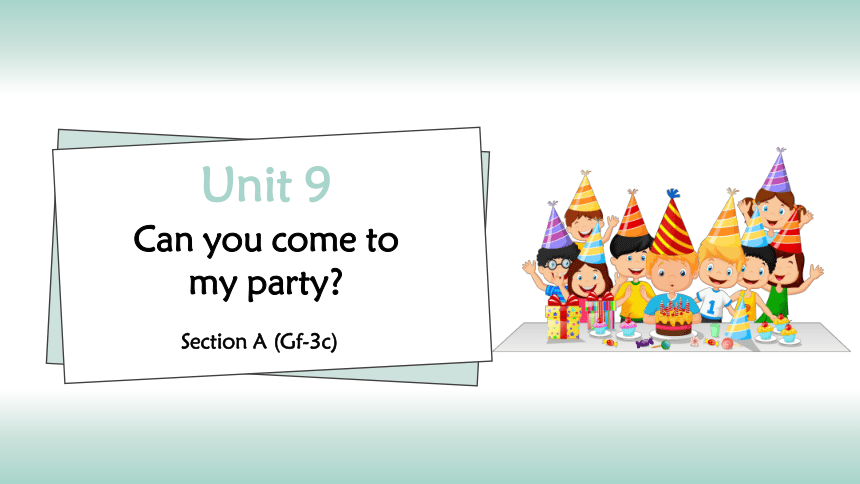 | |
| 格式 | pptx | ||
| 文件大小 | 30.4MB | ||
| 资源类型 | 试卷 | ||
| 版本资源 | 人教新目标(Go for it)版 | ||
| 科目 | 英语 | ||
| 更新时间 | 2022-11-09 16:17:04 | ||
图片预览

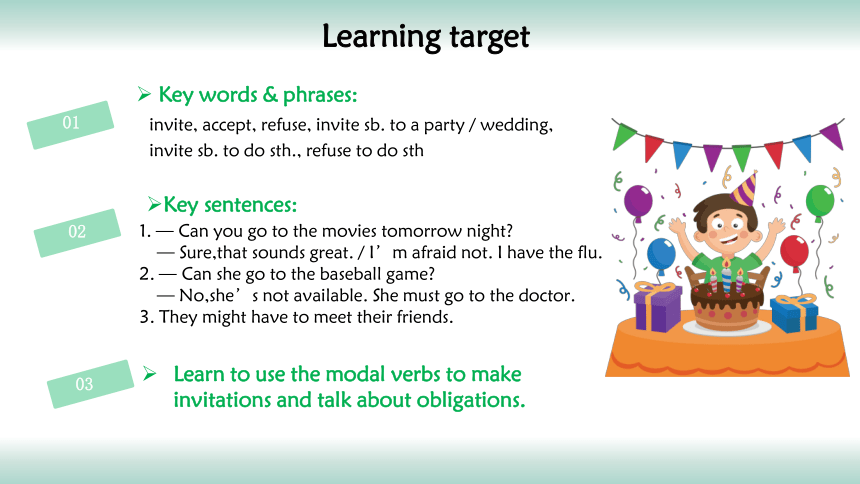
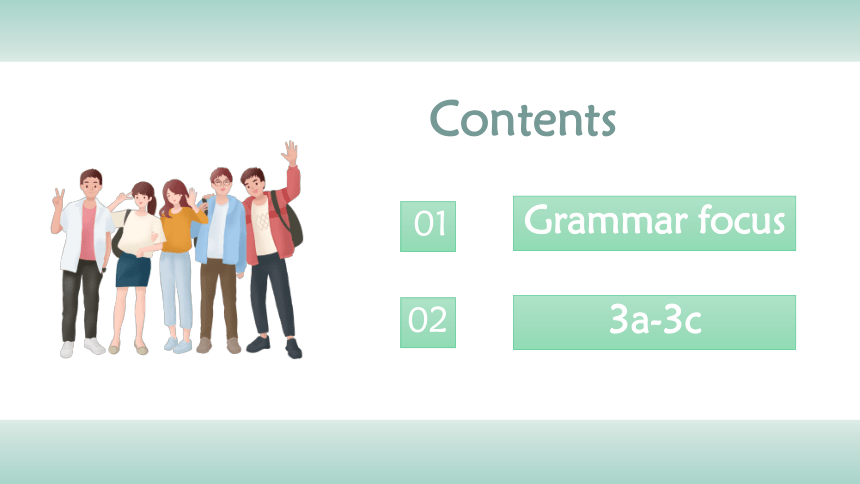
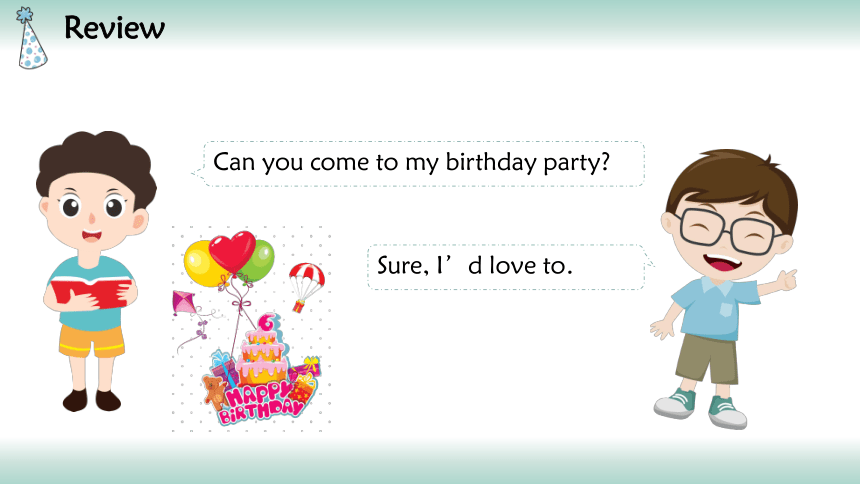
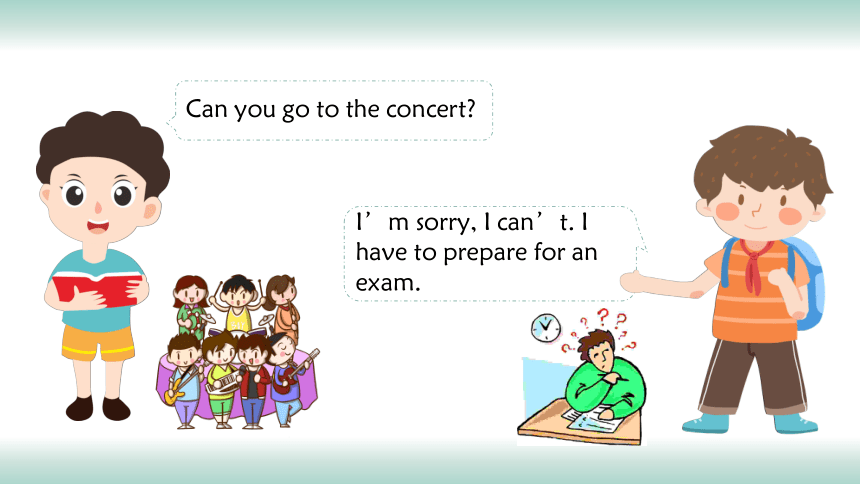
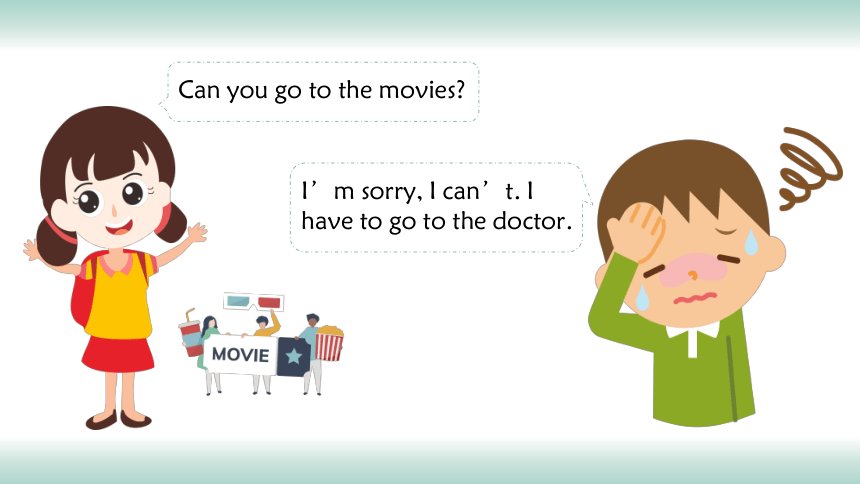
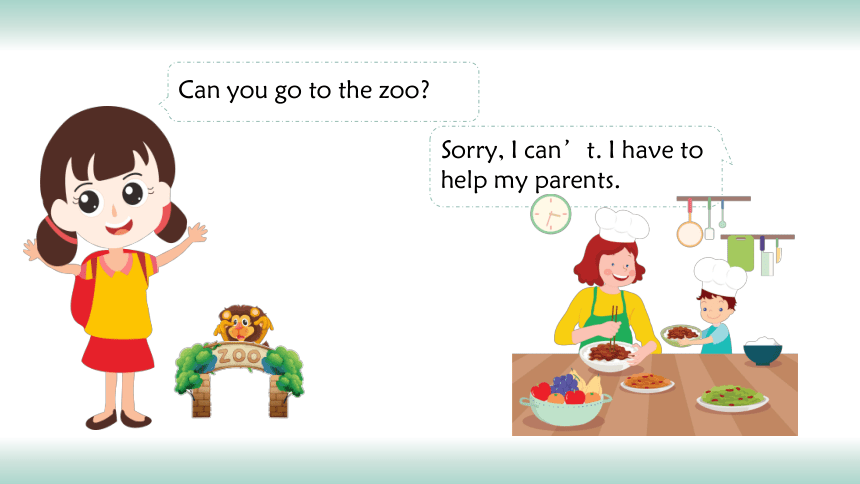
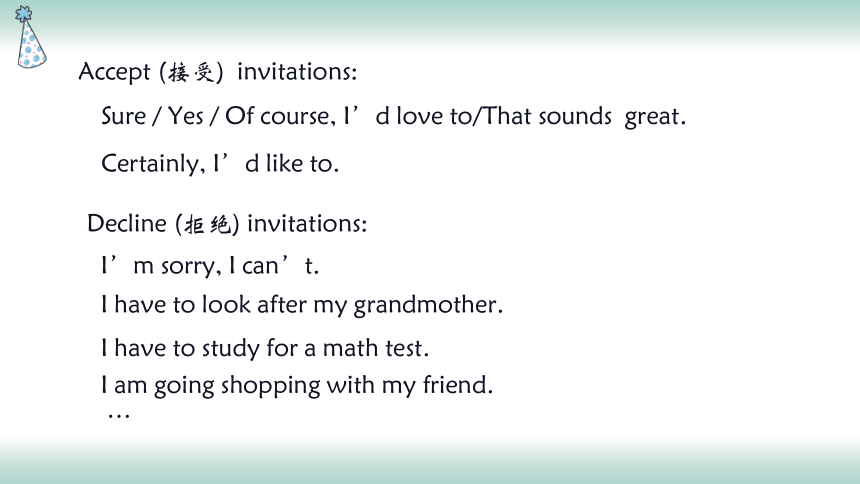
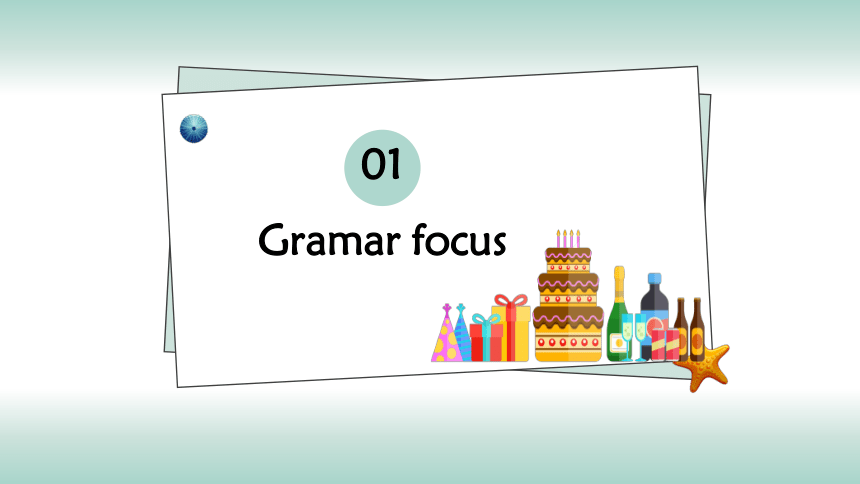
文档简介
(共29张PPT)
Unit 9
Can you come to
my party
Section A (Gf-3c)
Learning target
01
Key words & phrases:
invite, accept, refuse, invite sb. to a party / wedding, invite sb. to do sth., refuse to do sth
02
Key sentences:
1. — Can you go to the movies tomorrow night
— Sure,that sounds great. / I’m afraid not. I have the flu.
2. — Can she go to the baseball game
— No,she’s not available. She must go to the doctor.
3. They might have to meet their friends.
Learn to use the modal verbs to make invitations and talk about obligations.
03
01
Grammar focus
Contents
02
3a-3c
Review
Can you come to my birthday party
Sure, I’d love to.
Can you go to the concert
I’m sorry, I can’t. I have to prepare for an exam.
Can you go to the movies
I’m sorry, I can’t. I have to go to the doctor.
Can you go to the zoo
Sorry, I can’t. I have to help my parents.
Accept (接受) invitations:
Sure / Yes / Of course, I’d love to/That sounds great.
Decline (拒绝) invitations:
I’m sorry, I can’t.
Certainly, I’d like to.
I have to look after my grandmother.
I have to study for a math test.
I am going shopping with my friend.
…
Gramar focus
01
Can you come to my party on Saturday Sure, I’d love to. / Sorry, I must study for a math test.
Can you go to the movies tomorrow night Sure. That sounds great.
I’m afraid not. I have the flu.
Can he go to the party No, he can’t. He has to help his parents.
Can she go to the baseball game No. she’s not available. She must go to the doctor.
Can they go to the movies No, they’re not free. They might have to meet their friends.
Grammar focus
Language points 1 情态动词can
can表示“做某事的能力”, 意为“能, 会”,此时can引导的问句常用can或can't作肯定或否定回答。
例:—Can you sing in English?你能用英语唱歌吗?
—Yes, I can./No, I can’t. 是的, 我能。/我不能。
1. 情态动词can表示能力
拒绝回答:
① Sorry, I’m not available. 对不起,我没空。
② I’m sorry. I’m not free. I have to …
抱歉,我没空,我不得不……
③ I’d love to, but I’m afraid I can’t. I must …
我愿意,但是恐怕不行。我得……
接受回答:
① Sure / Yes, I’d love (like) to. 当然,我愿意。
② Sure / Of course. 当然。
……
2. 情态动词can表示邀请
can与第二人称连用,常用于熟人之间表示邀请或请求,即Can you...
拓展 发出邀请或请求时,也常用could使语气更委婉、客气。
请在此输入您的内容或者复制已经编辑好的文字粘贴至此处
01
02
03
Language points 2 情态动词might
表示请求,许可,意为“可以”,语气比may更委婉。
eg.Might I ask you a question
表示推测,意为“可能”,语气缓和,较委婉,可能性低于may。
eg.He might be sick.
may的过去式, 意为“可能”。
eg.He said he might come tomorrow.
Language points 3 情态动词have to与must
must 表示主观“必须”
have to表示客观客观需要,即“不得不” 。
have to 有人称和时态的变化,否定形式为 don’t / doesn’t / didn’t have to (没必要);
must 无人称和时态的变化,否定回答一般用 needn’t 或 don't have to (不必)。mustn’t 表示“禁止”。
have to有第三人称单数为“has to”,其他情态动词没有。
eg.You / He should study hard.你/他应该好好学习。
He has to study hard.他不得不好好学习。
情态动词have to与其他的情态动词,如can、 may、must和should 不同。
have to的一般疑问句要加助动词do、does或 did 才可
能完成其疑问、否定句的转变。
eg.Do they have to go to the party
They don’t have to go to the party.
3a-3c
02
watch TV on the weekend my cousin
visit my grandparents practice the violin
1. A: What are you going to do on Saturday
B: I’m not sure. I might _____________________
2. A: What are you planning to do after school
B: I don’t know. _________________
3. A: When will you finish the science homework
B: _____________________________________________
4. A: Who are you going to the movies with
B:______________________________________________
5. A: Are you free to come to my place on Saturday
B: _____________________________________________
visit my grandparents.
I might watch TV.
Complete the answers with might and one of the phrases in the box.
3a
I don’t know. I might finish it on the weekend.
I’m not sure. I might be going with my cousin.
I’m not sure. I might have to practice the violin.
Inviting: _________________________________(can / play tennis)
Accepting: _____________________________________________ 2. Inviting: __________________________________________ (would like to / go to the movies)
Refusing: ______________________________________________
Reason: _____________________________________(might have to)
Can you play tennis on Saturday
Sure. That sounds great.
Would you like to go to the movies on Friday
Sorry, I’m not available.
I might have to go out with my parents.
Complete the sentences below. Use the words in brackets to help you.
3b
3. Inviting: _______________________________
(can/hang out with us tonight)
Refusing: ________________________________
Reason: ________________________________ (must)
4. Inviting: _________________________________________
( would like to / come to my birthday party)
Accepting: _______________________________
Can you hang out with us tonight
Sorry, I’m not free.
I must study for a test.
Would you like to come to my birthday party
Sure. I’d love to.
Write down everything you have to do next week. Choose a day and time to have a party. Then invite classmates to your party.
3c
Can you come to my party
When is it
Next week, on Thrusday night.
I’m sorry. I have to study for a math test.
MON.
TUE.
WED.
THUR.
FRI.
SAT.
SUN.
go to the movies at night
visit my grandpa in the afternoon
look after my sister in the evening
prepare for the chess game at night
study for a test all day
invite sb. to + a party/wedding …
邀请某人参加聚会/婚礼……
eg.My best friend invited me to her birthday party.
意为“邀请”
invite sb. to do sth. 邀请某人做某事
eg.Yesterday Anna invited me to watch the film.
Language points
1.invite
accept,意为接受,表示主观上愿意接受。
receive表示客观上收到,但不一定会接受。
eg.I received a gift, but I didn’t accept it.
2. accepting
3. refusing
refuse作动词,与accept互为反义词。
refuse to do sth. “拒绝做某事”。
eg.Jenny refused my help politely.
Exercises
一、单项选择。
1. — ______ you come to my house to watch the baseball match on TV
—Sure, I’d love to.
A. May B. Must C. Should D. Can
2. — Today is my birthday. Can you come to my party tonight
— ______, but I should finish my homework first.
A. That’s too bad B. Yes, please
C. No, I don’t know D. I’d love to
3. —Why didn’t you come to my party
—I _____stay at home,because my mother was ill.
A. has to B. have to C. had D. had to
D
D
D
4. They were afraid that it _____ rain the next day.
A. must B. should C. might D. may
5. She ______ my invitation because she wasn’t available.
A. rewarded B. accepted C. refused D. received
6.Harry invited me ______ with him when his parents were out of town.
A.Stay B. stayed C. staying D. to stay
7. —Could you come back home for dinner
—______. I’ll be at a very important business meeting at that time.
A. I think so B. I’m afraid not
C. Yes, I hope so D. I’m afraid so
C
C
D
B
二、根据括号里的提示写出答语。
1.—Can you hang out with me this evening?(love)
—______________________________________
2.—Would you like to have dinner with us?(meet my friend)
—_____________________________________________________
3. —Can you go shopping with me tomorrow (study for the math test)
— ________________________________________
4. —Let's play tennis this afternoon. (a good idea)
—________________________________________
5. —Would you like to go to the concert?(have a piano lesson)
— ____________________________________________
Sure/Yes, I'd love to.
I'd love to, but I have to meet my friend at the train station.
Sorry, I can't. I have to study for the math test.
That's a good idea. /Sounds like a good idea.
I'd love to, but I have a piano lesson.
Homework
Review the sentences in Grammar Focus.
Practice how to accept or decline an
invitation.
Unit 9
Can you come to
my party
Section B (1a-1f)
Unit 9
Can you come to
my party
Section A (Gf-3c)
Learning target
01
Key words & phrases:
invite, accept, refuse, invite sb. to a party / wedding, invite sb. to do sth., refuse to do sth
02
Key sentences:
1. — Can you go to the movies tomorrow night
— Sure,that sounds great. / I’m afraid not. I have the flu.
2. — Can she go to the baseball game
— No,she’s not available. She must go to the doctor.
3. They might have to meet their friends.
Learn to use the modal verbs to make invitations and talk about obligations.
03
01
Grammar focus
Contents
02
3a-3c
Review
Can you come to my birthday party
Sure, I’d love to.
Can you go to the concert
I’m sorry, I can’t. I have to prepare for an exam.
Can you go to the movies
I’m sorry, I can’t. I have to go to the doctor.
Can you go to the zoo
Sorry, I can’t. I have to help my parents.
Accept (接受) invitations:
Sure / Yes / Of course, I’d love to/That sounds great.
Decline (拒绝) invitations:
I’m sorry, I can’t.
Certainly, I’d like to.
I have to look after my grandmother.
I have to study for a math test.
I am going shopping with my friend.
…
Gramar focus
01
Can you come to my party on Saturday Sure, I’d love to. / Sorry, I must study for a math test.
Can you go to the movies tomorrow night Sure. That sounds great.
I’m afraid not. I have the flu.
Can he go to the party No, he can’t. He has to help his parents.
Can she go to the baseball game No. she’s not available. She must go to the doctor.
Can they go to the movies No, they’re not free. They might have to meet their friends.
Grammar focus
Language points 1 情态动词can
can表示“做某事的能力”, 意为“能, 会”,此时can引导的问句常用can或can't作肯定或否定回答。
例:—Can you sing in English?你能用英语唱歌吗?
—Yes, I can./No, I can’t. 是的, 我能。/我不能。
1. 情态动词can表示能力
拒绝回答:
① Sorry, I’m not available. 对不起,我没空。
② I’m sorry. I’m not free. I have to …
抱歉,我没空,我不得不……
③ I’d love to, but I’m afraid I can’t. I must …
我愿意,但是恐怕不行。我得……
接受回答:
① Sure / Yes, I’d love (like) to. 当然,我愿意。
② Sure / Of course. 当然。
……
2. 情态动词can表示邀请
can与第二人称连用,常用于熟人之间表示邀请或请求,即Can you...
拓展 发出邀请或请求时,也常用could使语气更委婉、客气。
请在此输入您的内容或者复制已经编辑好的文字粘贴至此处
01
02
03
Language points 2 情态动词might
表示请求,许可,意为“可以”,语气比may更委婉。
eg.Might I ask you a question
表示推测,意为“可能”,语气缓和,较委婉,可能性低于may。
eg.He might be sick.
may的过去式, 意为“可能”。
eg.He said he might come tomorrow.
Language points 3 情态动词have to与must
must 表示主观“必须”
have to表示客观客观需要,即“不得不” 。
have to 有人称和时态的变化,否定形式为 don’t / doesn’t / didn’t have to (没必要);
must 无人称和时态的变化,否定回答一般用 needn’t 或 don't have to (不必)。mustn’t 表示“禁止”。
have to有第三人称单数为“has to”,其他情态动词没有。
eg.You / He should study hard.你/他应该好好学习。
He has to study hard.他不得不好好学习。
情态动词have to与其他的情态动词,如can、 may、must和should 不同。
have to的一般疑问句要加助动词do、does或 did 才可
能完成其疑问、否定句的转变。
eg.Do they have to go to the party
They don’t have to go to the party.
3a-3c
02
watch TV on the weekend my cousin
visit my grandparents practice the violin
1. A: What are you going to do on Saturday
B: I’m not sure. I might _____________________
2. A: What are you planning to do after school
B: I don’t know. _________________
3. A: When will you finish the science homework
B: _____________________________________________
4. A: Who are you going to the movies with
B:______________________________________________
5. A: Are you free to come to my place on Saturday
B: _____________________________________________
visit my grandparents.
I might watch TV.
Complete the answers with might and one of the phrases in the box.
3a
I don’t know. I might finish it on the weekend.
I’m not sure. I might be going with my cousin.
I’m not sure. I might have to practice the violin.
Inviting: _________________________________(can / play tennis)
Accepting: _____________________________________________ 2. Inviting: __________________________________________ (would like to / go to the movies)
Refusing: ______________________________________________
Reason: _____________________________________(might have to)
Can you play tennis on Saturday
Sure. That sounds great.
Would you like to go to the movies on Friday
Sorry, I’m not available.
I might have to go out with my parents.
Complete the sentences below. Use the words in brackets to help you.
3b
3. Inviting: _______________________________
(can/hang out with us tonight)
Refusing: ________________________________
Reason: ________________________________ (must)
4. Inviting: _________________________________________
( would like to / come to my birthday party)
Accepting: _______________________________
Can you hang out with us tonight
Sorry, I’m not free.
I must study for a test.
Would you like to come to my birthday party
Sure. I’d love to.
Write down everything you have to do next week. Choose a day and time to have a party. Then invite classmates to your party.
3c
Can you come to my party
When is it
Next week, on Thrusday night.
I’m sorry. I have to study for a math test.
MON.
TUE.
WED.
THUR.
FRI.
SAT.
SUN.
go to the movies at night
visit my grandpa in the afternoon
look after my sister in the evening
prepare for the chess game at night
study for a test all day
invite sb. to + a party/wedding …
邀请某人参加聚会/婚礼……
eg.My best friend invited me to her birthday party.
意为“邀请”
invite sb. to do sth. 邀请某人做某事
eg.Yesterday Anna invited me to watch the film.
Language points
1.invite
accept,意为接受,表示主观上愿意接受。
receive表示客观上收到,但不一定会接受。
eg.I received a gift, but I didn’t accept it.
2. accepting
3. refusing
refuse作动词,与accept互为反义词。
refuse to do sth. “拒绝做某事”。
eg.Jenny refused my help politely.
Exercises
一、单项选择。
1. — ______ you come to my house to watch the baseball match on TV
—Sure, I’d love to.
A. May B. Must C. Should D. Can
2. — Today is my birthday. Can you come to my party tonight
— ______, but I should finish my homework first.
A. That’s too bad B. Yes, please
C. No, I don’t know D. I’d love to
3. —Why didn’t you come to my party
—I _____stay at home,because my mother was ill.
A. has to B. have to C. had D. had to
D
D
D
4. They were afraid that it _____ rain the next day.
A. must B. should C. might D. may
5. She ______ my invitation because she wasn’t available.
A. rewarded B. accepted C. refused D. received
6.Harry invited me ______ with him when his parents were out of town.
A.Stay B. stayed C. staying D. to stay
7. —Could you come back home for dinner
—______. I’ll be at a very important business meeting at that time.
A. I think so B. I’m afraid not
C. Yes, I hope so D. I’m afraid so
C
C
D
B
二、根据括号里的提示写出答语。
1.—Can you hang out with me this evening?(love)
—______________________________________
2.—Would you like to have dinner with us?(meet my friend)
—_____________________________________________________
3. —Can you go shopping with me tomorrow (study for the math test)
— ________________________________________
4. —Let's play tennis this afternoon. (a good idea)
—________________________________________
5. —Would you like to go to the concert?(have a piano lesson)
— ____________________________________________
Sure/Yes, I'd love to.
I'd love to, but I have to meet my friend at the train station.
Sorry, I can't. I have to study for the math test.
That's a good idea. /Sounds like a good idea.
I'd love to, but I have a piano lesson.
Homework
Review the sentences in Grammar Focus.
Practice how to accept or decline an
invitation.
Unit 9
Can you come to
my party
Section B (1a-1f)
同课章节目录
- Unit 1 Where did you go on vacation?
- Section A
- Section B
- Unit 2 How often do you exercise?
- Section A
- Section B
- Unit 3 I'm more outgoing than my sister.
- Section A
- Section B
- Unit 4 What's the best movie theater?
- Section A
- Section B
- Unit 5 Do you want to watch a game show?
- Section A
- Section B
- Unit 6 I'm going to study computer science.
- Section A
- Section B
- Unit 7 Will people have robots?
- Section A
- Section B
- Unit 8 How do you make a banana milk shake?
- Section A
- Section B
- Unit 9 Can you come to my party?
- Section A
- Section B
- Unit 10 If you go to the party, you'll have a grea
- Section A
- Section B
